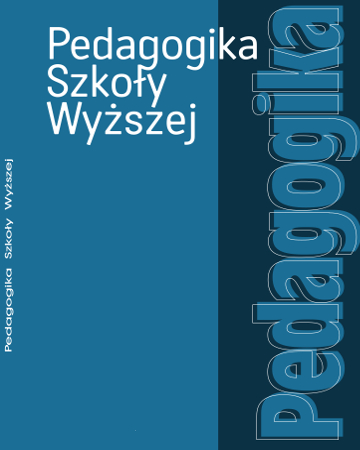
ISSN: 2083-4381
OAI
DOI: 10.18276/psw.2015.2-02


Lista wydań /
2/2015
Nauczyciel akademicki – dylematy, napięcia, ambiwalencja roli
| Autorzy: |
Anna
Sajdak
Uniwersytet Jagielloński |
| Słowa kluczowe: | nauczyciel akademicki dydaktyk ambiwalencja rola zawodowa |
| Data publikacji całości: | 2015 |
| Liczba stron: | 17 (49-65) |
Abstrakt
In the article the Author presents a thesis that a significant part of the dilemmas of an academic teacher – didactician are related to experiencing various types of ambivalence and tensions involved in this professional role. She addresses the category of ambivalence, considers its usefulness in the reflection upon the professional role, and presents two major areas in which tensions are experienced. Accordingly, she describes ambivalence as a tension caused by finding oneself in the field of opposing expectations and normative requirements concerning the professional role, established by the employer and finding their manifestation e.g. in the inconsistency of set tasks and the system of evaluation and promotion of an employee, that is, ambivalence inscribed in the triad of being a scientist, didactician and a certain type of manager all at the same time. Another presented area concerns the role ambivalence understood as a tension resulting from diversity and self-contradictory nature of a didactic role of an academic teacher, whose task is often to combine the roles of a teaching expert giving canonical lectures, a workshop trainer creating self-learning possibilities for students, an animator of shared experiences, or an empathic tutor supporting an individual path of development of a given person. Each of those roles requires the activation of different personal resources, different educational tools and different types of relations with students.
Pobierz plik
Plik artykułu
Bibliografia
| 1. | Bauman T., Dydaktyka szkoły wyższej, w: Encyklopedia pedagogiczna XXI wieku, t. I, red. T. Pilch, Warszawa 2003. |
| 2. | Bauman T., Uniwersytet wobec zmian społeczno-kulturowych, Wyd. UG, Gdańsk 2001. |
| 3. | Bereźnicki F., Zagadnienia dydaktyki szkoły wyższej, Wyższa Szkoła Humanistyczna TWP w Szczecinie, Szczecin 2009. |
| 4. | Bochno E., Sens i bezsens „bycia” adiunktem. Refleksje z perspektywy doktorów pedagogiki, w: Pedagogika. Zakorzenienie i transgresja, red. M. NowakDziemianowicz, P. Rudnicki, Wyd. Dolnośląskiej Szkoły Wyższej, Wrocław 2011. |
| 5. | Czerepaniak-Walczak M., Homo academicus w świecie homo oeconomicus. O obszarach i przejawach zmagań z akademickim zniewoleniem, „Pedagogika Szkoły Wyższej” 2014, nr 1. |
| 6. | Freimuth J., Moderation in der Hochschule. Konzepte und Erfahrungen in der Hochachullehre und Hochschulenentwicklung, WindmühleVerlag, Hamburg 2000. |
| 7. | Heller M., Jak być uczonym, Znak, Kraków 2009. |
| 8. | Hessen S., Podstawy pedagogiki, tłum. A. Zieleńczyk, Żak, Warszawa 1997. |
| 9. | Kołakowski L., Po co uniwersytet?, „Gazeta Wyborcza” 1994, nr 61. |
| 10. | Kwiatkowska H., Pedeutologia, Wydawnictwa Akademickie i Profesjonalne, Warszawa 2008. |
| 11. | Sajdak A., Paradygmaty kształcenia studentów i wspierania rozwoju nauczycieli akademickich. Teoretyczne podstawy dydaktyki akademickiej, Impuls, Kraków 2013. |
| 12. | Sajdak A., Przygotowanie nauczycieli akademickich do prowadzenia zajęć dydaktycznych – możliwości wsparcia i przykłady dobrych praktyk, „Studia Oeconomica Posnaniensia” 2015, vol. 3. |
| 13. | Stahr I., Academic Staff Development: Entwiclung von Lehrkompetenz, w: Wander der Lehr- und Lernkulturen, red. R. Schneider, B. Szczyrba, U. Welbers, J. Wildt, W. BertesmannVerlag, Bielefeld 2009. |
| 14. | Świerzbowska-Kowalik E., Nauczyciele akademiccy i studenci, „Nauka i Szkolnictwo Wyższe” 1993, nr 1. |
| 15. | Witkowski L., Ambiwalencja w kulturze jako wyzwania dla pedagogiki ogólnej, w: Rozwój pedagogiki ogólnej. Inspiracje i ograniczenia kulturowe oraz poznawcze, red. A. Bogaj, Akademia Świętokrzyska im. Jana Kochanowskiego w Kielcach, Warszawa–Kielce 2001. |
| 16. | Witkowski L., Między pedagogiką, filozofią i kulturą. Studia, eseje, szkice, t. III, IBE, Warszawa 2007. |
| 17. | http://ec.europa.eu/education/higher-education/doc/modernisation_en.pdf (21.01.2014) |